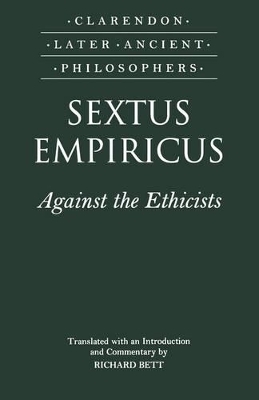
Sextus Empiricus: Against the Ethicists
Seiten
2000
Oxford University Press (Verlag)
978-0-19-825097-5 (ISBN)
Oxford University Press (Verlag)
978-0-19-825097-5 (ISBN)
This volume contains a translation into clear modern English of an unjustly neglected work by Sextus Empiricus, together with introduction and extensive commentary. Sextus is our main source for the doctrines and arguments of ancient Scepticism; in Against the Ethicists he sets out a distinctive Sceptic position in ethics.
About Sextus:
Sextus Empiricus is one of the most important ancient philosophical writers after Plato and Aristotle. His writings are our main source for the doctrines and arguments of Scepticism. He probably lived in the second century AD. Eleven books of his writings have survived, covering logic, physics, ethics, and numerous more specialized fields.
About Against the Ethicists:
In this unjustly neglected and misunderstood work Sextus sets out a distinctive Sceptic position in ethics. He discusses the concepts good and bad, and puts forward the sceptical argument that nothing is either good or bad by nature or intrinsically or invariably, but only relatively to persons and/or to circumstances. He then argues that the sceptic is better off than the non-sceptic. In the latter part of the book, Sextus attacks the Stoic view that there is such a thing as a 'skill for life'.
About this edition:
This volume contains a translation of Against the Ethicists into clear modern English, together with an introduction and a detailed commentary. Those who have discussed this work in the past have tended to underestimate it, often regarding its main position as essentially the same as that of Sextus' better-known Outlines of Pyrrhonism. Richard Bett shows that Against the Ethicists represents a quite distinct and coherent philosophical outlook, associated with a phase of Scepticism earlier than Sextus himself, an outlook of which little other evidence survives.
About Sextus:
Sextus Empiricus is one of the most important ancient philosophical writers after Plato and Aristotle. His writings are our main source for the doctrines and arguments of Scepticism. He probably lived in the second century AD. Eleven books of his writings have survived, covering logic, physics, ethics, and numerous more specialized fields.
About Against the Ethicists:
In this unjustly neglected and misunderstood work Sextus sets out a distinctive Sceptic position in ethics. He discusses the concepts good and bad, and puts forward the sceptical argument that nothing is either good or bad by nature or intrinsically or invariably, but only relatively to persons and/or to circumstances. He then argues that the sceptic is better off than the non-sceptic. In the latter part of the book, Sextus attacks the Stoic view that there is such a thing as a 'skill for life'.
About this edition:
This volume contains a translation of Against the Ethicists into clear modern English, together with an introduction and a detailed commentary. Those who have discussed this work in the past have tended to underestimate it, often regarding its main position as essentially the same as that of Sextus' better-known Outlines of Pyrrhonism. Richard Bett shows that Against the Ethicists represents a quite distinct and coherent philosophical outlook, associated with a phase of Scepticism earlier than Sextus himself, an outlook of which little other evidence survives.
Richard Bett is Professor of Philosophy at the Johns Hopkins University, Baltimore. He was educated at Oxford and at the University of California, Berkeley, and he was Assistant Professor of Philosophy at the University of Texas, Arlington, from 1986 to 1991.
INTRODUCTION; AGAINST THE ETHICISTS: TRANSLATION; COMMENTARY; APPENDICES; BIBLIOGRAPHY; INDEXES.
| Erscheint lt. Verlag | 1.9.2000 |
|---|---|
| Reihe/Serie | Clarendon Later Ancient Philosophers |
| Übersetzer | Richard Bett |
| Verlagsort | Oxford |
| Sprache | englisch |
| Maße | 138 x 215 mm |
| Gewicht | 398 g |
| Themenwelt | Geisteswissenschaften ► Philosophie ► Ethik |
| Geisteswissenschaften ► Philosophie ► Philosophie des Mittelalters | |
| ISBN-10 | 0-19-825097-5 / 0198250975 |
| ISBN-13 | 978-0-19-825097-5 / 9780198250975 |
| Zustand | Neuware |
| Haben Sie eine Frage zum Produkt? |
Mehr entdecken
aus dem Bereich
aus dem Bereich
unsere kollektive Verantwortung
Buch | Hardcover (2023)
wbg Theiss in Wissenschaftliche Buchgesellschaft (WBG) (Verlag)
35,00 €


